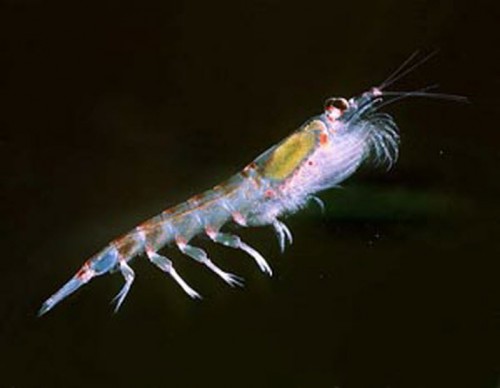 By Debra Chase
By Debra Chase
Krill is said to be the largest biomass on the planet, outweighing the human population of the world. Yet in size it is tiny, relative in size to a paper clip, measuring on average about two inches in length. These small, shrimp-like crustaceans run the Earth’s marine ecosystem and, surprisingly, are instrumental in sinking carbon into the ocean. Yet, alarmingly, there has been an 80% decline in krill populations over the last 30 years. These declines are due in part to the ice cover loss in the Antarctic, caused by human induced global warming. This ice cover loss removes a primary source of food for the krill: ice-algae. The little pink, opaque creatures are starting to appear as the ubiquitous “canary in the coal mine.” Simply put, without krill, most of the life forms in the Antarctic would disappear.
Antarctic krill are known as among the largest of the eighty-five known krill species. Their estimated numbers range from 125 million tons to 6 billion tons in the waters around Antarctica. During certain times of the year, krill congregate in swarms so dense and widespread that they can be seen from space. Their longevity, of up to ten years, is astounding for such a small creature. Heavily hunted, they spend their days avoiding predators by diving deep into the cold depths of the Antarctic Ocean, one hundred meters below the surface, and at night they will swim up toward the surface in search of food. It is the up and down, surface to the deep, movements that allow the krill to capture carbon. As they rise, the carbon is captured and then as they dive and excrete their waste, they deposit the carbon into the ocean depths. Because they do this maneuver many times every night they are instrumental in pulling carbon from the atmosphere at an amount equivalent to the annual emissions of 35 million cars – and this makes these tiny animals much more important than originally thought.
The global human food chain has been farming these tiny creatures for decades. Humans harvest an estimated 150,000 – 200,000 tonnes annually. Used in everything from farmed fish food – that humans then eat – to dog food, and fish oil capsules for humans, these small, shrimp-like crustaceans are essentially the fuel that runs the engine of the Earth’s marine ecosystems. Krill feed on phytoplankton: microscopic, single-celled plants that live off carbon dioxide and the sun’s rays that drift near the ocean’s surface. The krill, in turn, are the main staple in the diets of literally hundreds of different animals; the 200-ton blue whale eats up to 4 tons of krill a day, and numerous fish species, seabirds and penguins, as well as seals, also survive on this tiny creature.
Every year the ice in the Antarctic region is freezing later and melting earlier, essentially creating a winter that is 90 days shorter than normal. Imagine winter in the United States being 90 days shorter than normal. This type of change would drastically affect food production. This is what scientists think is crashing the krill population. As the sea ice melts and the winter shortens, the krill’s life cycle is affected. One leading theory says the krill’s life cycle is driven by an internal body clock that responds to the summer melt and winter growth of the arctic ice pack. Through recent study and observation, scientists discovered that the loss of the ice extant correlates with the density of the krill. As climate change alters this timing of the ice pack, the krill’s life cycle is disrupted, causing them to vanish. It has become obvious that winter sea ice season is crucial for the krill’s survival when the phytoplankton food supply isn’t blooming.
Despite this knowledge, krill harvesting is continuing a common trend in the fishing industry: fishing further from home and further down the food chain until the species are gone. The Antarctic is about as far away from home as anyone can get, and the krill are down at the bottom of a crucial food web. Without climate change mitigation and real control of the fisheries, the end is near.





“These declines are due in part to the ice cover loss in the Antarctic, caused by human induced global warming. “
Regardless of one’s beliefs about whether global warming is induced by human activity or not, it would be highly irresponsible to not accept that there are adverse consequences to this trend and that there are actions that humans can take to offset those consequences. Changes in how we manage ( or simply stop destroying) the natural environment of species can be effective in restoring their populations. Although krill are not as “adorable” as pandas, the decrease in numbers should at least give us pause with regard to irresponsible harvesting practices.
There has been discussion of dispersing iron in the southern ocean to increase productivity. Likely that will be more effective than trying to get everybody onboard with reducing output.
Cinema Modeoff
The Coming Ice Age – Climate Hysteria Circa 1978
https://video.search.yahoo.com/yhs/search?fr2=piv-web&p=the+coming+ice+age&hspart=att&hsimp=yhs-att_001#id=50&vid=663ce1dce6001e5b2c6901ce6063b085&action=view
This reply is just intellectually lazy.
As the video states, “climate experts believe that the next ice age is on its way, according to recent evidence”.
Again, intellectually lazy. It’s just knee-jerk denialism. It’s your way of saying you don’t believe in science.
Overfishing of various species is an issue regardless of climate change, and will likely be exacerbated by ocean acidification. Ocean acidification is a provable phenomenon. The impact of climate change is being observed and measured in ocean ecosystems. In my opinion this requires adaptation via fisheries treaties and active management of the harvest of important ocean food species. Krill is one of those species, eaten by people as well as animals higher on the food chain in the Antarctic. There is debate as to whether current protections are sufficient. That’s worthy of discussion. Your reply was just trolling.
Just shows how in 38 short years the so-called experts have gone from alarming us about the coming ice age to global warming. Are they to be believed now?
http://www.skepticalscience.com/ice-age-predictions-in-1970s-intermediate.htm
“few papers predicted global cooling (7 in total). Significantly more papers (42 in total) predicted global warming”
So if we apply this to one person, who has done no research at all, issues an opinion about pollution at Nishi what do we have.
BP, what you don’t understand about science is that it was developed to eliminate the need for a “belief” system.
This isn’t science, it is the part of scripture of a pseudo religion that fills the spiritual needs of the secular liberal intellectual.
You would recognize it as real science when the theories are not routinely spouted in the political sphere as absolutes by those with a direct conflict of interest connected to the related responses they demand.
More insults, no substance. You are getting very tiresome.
Odin,
when you are working with events that do not offer reproducibility checks then you have theories that are not proven. if you have unproven theories then you need to have some degree of belief.
BP
“As the video states, “climate experts believe that the next ice age is on its way, according to recent evidence”.”
And doctors used to believe that “bleeding” a patient was the best available treatment for a number of different conditions. Because those particular practitioners were wrong, does that mean that you would not believe your doctor today if he told you that you had a bacterial infection and needed an antibiotic, or that you had diabetes and needed insulin ? Would you decline appropriate treatment because there had been a serious misunderstanding of human physiology in the past so you must eschew all beliefs about physiology even when there is overwhelming evidence ?
Krill harvest has been under active management by international agreement for a couple of decades now.
http://www.pri.org/stories/2015-07-14/scientists-consider-whether-krill-need-be-protected-human-over-hunting
Nothing here folks but liberal anti-industrialism, new world order, environmental wacko, propaganda.
Too bad, because there might be an actual topic here worth discussing.
So discuss it. Your reply is also intellectually lazy. Try again. You can do better than this.
That “man is causing all the global warming and killing the krill” comment was intellectually lazy and political. So no.
Then don’t bother commenting on articles like this. Seriously. You just insult the author, make no valid points about the topic, and add nothing to the discussion.
The valid point is to stop inserting “man-made global warming” as the cause of everything anyone can find wrong with the world.
My tooth hurts… must be global warming.
It is a sickness.
I was watching Al Roker talk about a heat wave going around the country and he says: “it is just going to keep getting hotter if we don’t do something about it.”
The “doing something about it” it is to shout down those that misuse and abuse their position to spout unproven and irrational idiocy connected to the THEORY of anthropogetric global warming.
https://www.nasa.gov/content/goddard/antarctic-sea-ice-reaches-new-record-maximum
So this basically invalidates the entire “man made global warming” claim in this article. So then, why was it included?
Frankly, you “cherry-picked” from the article… no surprise… if you read the entire article, you would have seen that the Arctic ice cover loss was much more extensive than the gain in the Antarctic…
So… you were correct on Antarctica, yet were not “thorough” in refuting the overall concept… that said, it is clearly unclear how much is “climate change” (which historically has been cyclical) and whether or not it is “man-made”, and if so, if there is really anything we can do about it.
Perhaps we should re-visit the “ozone layer” threats…
hpierce, I read that. But the author didn’t apparently because her entire point is based on the “ice cover loss in the Antarctic.” She did not write “overall loss of ice cover between the arctic and antarctic.”
I acknowledged you were correct on that point. Good job.
You still “cherry-picked”… too many would think your quotes (if they were too lazy/busy to read the entire article) refuted the whole “climate change”/”global warming” thing… it doesn’t… not even close… it actually might give others “fuel for the fire” (hopefully, no smoke, nor carbon based fuel) to argue the OTHER way.
Maybe 500-1000 years from now we can assess and argue about “who was right”… climatic cycles are, “glacial” as far as long term trends…
Why would I do her work for her?
My hair catches fire when I see this scientific theory being misused and exploited to back an ideology or worldview or other agenda.
Unfortunately even educated and intelligent people start to absorb the sound bites and the myth becomes defacto “truth”… except it is not.
A hard counter is useful to prevent this. A soft counter would give the myth-maker a sense that they are safe from criticism.
I did not write the article. I think it is an interesting one and warrants attention. But the writer would be advised to at least get her facts straight if she is going to blame industrialized man for yet another environmental “crisis”.
Why would you respond in partial truths, and add to her schtick?… strategic failure, sir… a potentially self-inflicted wound, as it were…
You are technically correct, but apparently fail to understand how to further your arguments… in a meaningful way… tried to suggest this to you before… no longer… apparently not worth the effort… am sure you will attack me on this, in spite of basic agreement… I care not… just reload before you shoot yourself and your ideas/beliefs in the foot again…
I like the direct way. Sometimes a good game of chess is enjoyable, but I like target shooting and good game of basketball better.
Frankly
“You would recognize it as real science when the theories are not routinely spouted in the political sphere as absolutes by those with a direct conflict of interest connected to the related responses they demand.”
So how far are you willing to take this argument. Moving it into the medical realm since that is where I am most comfortable are we to believe that it is just a bunch of political nonsense that vaccines have been highly effective in eradicating a number of serious diseases just because manufacturers produce vaccines and some very visible, very vocal people claim that the manufacturers are making false claims and poisoning children to make excessive profits ?
In my speciality, are we to not believe that long acting highly reliable contraceptives are not effective and actually cause sterility because they produce profits for drug manufacturers who some people claim are hiding their harms and are actually abortifacients because of their own political/moral frameworks ?
When can we accept that science is not a religion, but a process of organized examination of the world which can be used by either the scientists, or journalists, or politicians, or advocates of a particular theory to advance their own causes ?
Your analogy does not work.
How about this… a large group of activists demands increasing regulation to stop the production and consumption of alchohol because 90% of scientists agree that the consumption of alchohol is causing damage to the family environment.
The man-made global warming theory is a boondoggle for those born with a bossy gene, obsessed with thinking they should be able to tell everyone else how to live their life.
July 2016: 2016 Climate Trends Continue to Break Records
The tragedy of the commons is an economic theory of a situation within a shared-resource system where individual users acting independently according to their own self-interest behave contrary to the common good of all users by depleting that resource through their collective action.
quielo – this is a theory that would apply for many things and at many levels but is routinely debunked. In almost everything there are limited resources. It is generally only when the ruler intervenes to parcel out resources in what the ruler deems is an adequately fair division that the users of the resource stop thinking about sustainability.
This is classic leadership science… leveraging and tapping the natural human tendency to want to do right. To care for the tribe. To see self interests being met by benefiting something larger than self.
When we fill the environment with rules, the ruler makes the decision and everyone else is a follower.
Otherwise everyone one else is equal in leadership to be good stewards of the resources.
Here is the test. Put a box of donuts in the break room with no rules and watch how most employees would be considerate of the number of donuts and the number of employees that would want one.
Now have the company put out the donuts with a bunch of rules, and the employees will shift to how they can exploit the rules to get more donuts.
In any case, when we run out of fossil fuels, then we will have to use sustainable alternative energy.
Overfishing is a well-known phenomenon. I could give you lots of examples.
Frankly,
“routinely debunked.” Cite please.
In addition to fishing there is also pollution and I would argue, schools.
http://www.aei.org/publication/elinor-ostrom-and-the-solution-to-the-tragedy-of-the-commons/
https://youtu.be/kOomUpEdLE4?list=UUFHCypPBiy5cpLKFX11q0QQ
Ownership, private property, capitalism, free enterprise. They unleash the individual moral mind and humanize humans instead of fomenting collectivist behavior.
Note too that capitalism (exploitation of natural resources) also helped improve the efficiency and productivity from the resources. So in effect have an effect of conservation.
And just take a look at all the central control systems in and around the globe and ask how they are doing in their stewardship of natural resources compared to the home of the free and the brave.
I remember having this debate with some liberal friends about this theory and of course we did not agree. I told them that as an Eagle Scout and from the teachings of my family we always left the camp ground better than we found it because we wanted to come back to it again. They said they used to throw empty beer cans out the window when they drove down the road.
So, I think maybe the appeal of the theories that man is a hazard unless constrained and controlled by rules and rulers is favored by those that have a screw loose in self control. Or maybe it is just a problem with our education system.
“In any case, when we run out of fossil fuels, then we will have to use sustainable alternative energy”
Bacteria have the same issues though they often poison themselves with their waste products before they run out of food.
Frankly,
Read your link and not impressed. Basically the authors offer two ways of getting rid of commons (platting or cooperative ownership). Platting the oceans would not a viable solution and since the currents carry pollutants around I do not see what help that would provide.
Cooperative ownership with active management is possible but I don’t see who would be the manager other than the UN. For them to manage the oceans they would need a navy and other enforcement tools. I really don’t see us financing a navy for the UN.
Frankly
“obsessed with thinking they should be able to tell everyone else how to live their life.”
Equally true for those who would impose their religious beliefs on others as in our society Christians have done for the majority of my life with laws and policies limiting the self sufficiency of women, limiting the health care available to women, blocking gay rights, now fighting to tell transgender individuals where they can and cannot pee.
At least those who are basing their recommendations on science have some observable trends to support their warnings even if you do not believe that the trends are man made.
Wow… that is quite a bit of baseless Christian bashing. You seem to have a strong negative bias against Christians. I think science can explain that too.
Frankly
“You seem to have a strong negative bias against Christians.”
No. I have a strong bias against Christians imposing laws that limit how I live my life or practice my profession. Are you denying that there are many places in the country where what a physician must say to his or her patient is being scripted by non physicians based not on medical evidence but upon their own religious based beliefs ?
I also have a strong bias against anyone, Christian, Jewish, Muslim …., telling an individual woman what she can and cannot wear. I also have a bias against anyone imposing their religious beliefs on what gender pairings can and cannot marry.
LOL, soda tax anyone?
Tia sounds like she’s on the same page as the rest of us who don’t like social engineering.
BP, I suspect that most supporters of the soda tax would argue that it does not limit how you can live your life at all. Your choices of beverage are not in any way limited by the imposition of a soda tax.
I also suspect that an argument can be made that over consumption of sugar-laden soda unilaterally imposes a “tax” on everyone who pays health insurance premiums. They would further argue that a person who chooses to avoid the soda tax by not consuming sugary beverages, also eliminates his/her personal contribution to the insurance premium “tax” for the treatment costs of illnesses related to high sugar consumption (e.g. diabetes, etc.).
A good Paul Harvey news cast includes both the portion before the commercial and the “rest of the story” after the commercial. Take a lesson from Paul. You are being taxed regardless. The soda companies are practicing social engineering . . . and laughing all the way to the bank while doing so.
Ahhh… now we see that someone is not only not religious, but actually anti-religion…
See… https://en.wikipedia.org/wiki/List_of_Christians_in_science_and_technology
We should immediately reject all those so-called ‘scientists’ (and all their works) because they were Christians.
An to be fair, we should reject all pseudo science from folk who were Jewish… see https://en.wikipedia.org/wiki/List_of_Jewish_scientists_and_philosophers
Same could be said of those who professed a faith in Islam, Hinduism, etc.
Excellent point, Tia… we should completely disregard any “science” that come from folk who are religious…
hpierce
“Excellent point, Tia… we should completely disregard any “science” that come from folk who are religious…”
Well I am certainly glad that you are feeling proud of your “excellent point”, however, I humbly must decline your having attributed it to me since I said nothing of the kind. I have known a number of excellent scientists and medical researchers who have very strong religious beliefs. Being a person of strong religious conviction in no way precludes one from having an open mind and a curiosity about the way in which our world is organized. To claim I have stated anything to the contrary is a needless “cheap shot” which you seem to abhor…..at least when I do it.
“…alarmingly, there has been an 80% decline in krill populations over the last 30 years. These declines are due in part to the ice cover loss in the Antarctic”
Would be interesting to know what other factors are contributing to the decline in krill populations; such a large decline is highly significant for ocean life via ocean food chain. I wonder if direct effects of climate change (slightly warmer water and less ice cover area, and more CO2/carbonate rich water with coupled shift to slightly more acidic pH) are having a dominant effect on the krill population; or if instead other factors might be dominant? I don’t see any need for climate change to be the primary focus here; if it turns out that other factors are more important than climate change effects; there is danger of ‘crying wolf’ here–wait until we’re sure climate change is the wolf!
On another note; I wasn’t aware that sea ice cover loss has been significant in the Antarctic; though it is very clearly been decreasing substantially in the Arctic ocean (and nearby subarctic waters). I don’t have time to research this; does anyone have a link for ocean ice cover trends around Antarctica?
See my link above. I covered that point.
From the source cited by Frankly above, https://www.nasa.gov/content/goddard/antarctic-sea-ice-reaches-new-record-maximum “Sea ice surrounding Antarctica reached a new record high extent this year, covering more of the southern oceans than it has since scientists began a long-term satellite record to map sea ice extent in the late 1970s. The upward trend in the Antarctic, however, is only about a third of the magnitude of the rapid loss of sea ice in the Arctic Ocean”
It’s not clear from this citation what the average annual sea ice area is around Antarctica (this article mentions just the annual maximum extent coverage). It would be great if the author Debra Chase could provide links to comprehensive studies on trends in annual average sea ice areal extent around Antarctica.